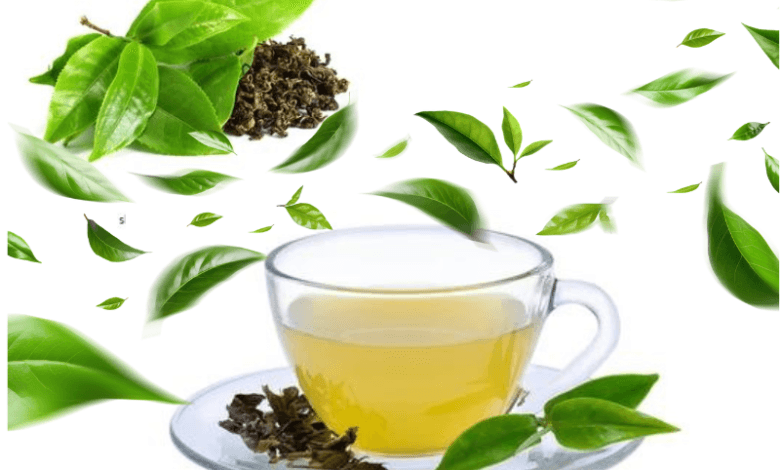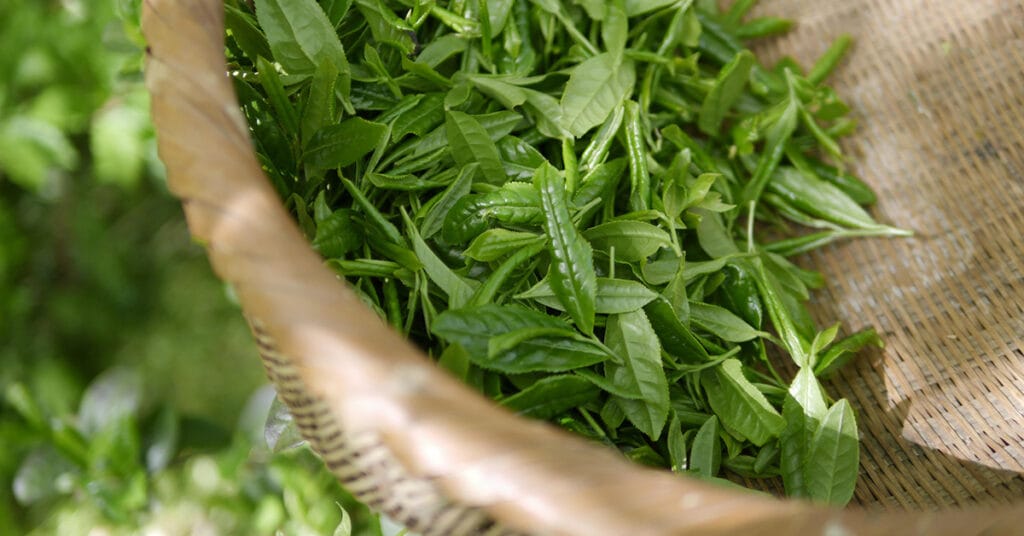Best green tea for health
Everything you need to know about green tea

Green tea is a popular health drink that is widely used all over the world. Therefore, in this article, we will learn about the benefits of green tea, among its antioxidant properties, for example, green tea’s promotion of metabolism, and its effect on cardiovascular health. Furthermore, we will discuss the history of green tea, methods of preparing it, and possible side effects of drinking it.
Label “green tea”
The name “green tea” is derived from the color of the tea leaves and the essence of the brewed beverage itself. When preparing green tea, the leaves retain their natural green color due to the quick drying process that prevents oxidation. In other types of tea, such as black tea, the leaves undergo oxidation, which transforms their color to a dark brown or black. Green tea maintains its green hue because of the rapid processing after the leaves are picked, which inhibits this color change.
The tradition of drinking green tea dates back thousands of years, especially in Asian cultures like China and Japan. In these regions, tea has been considered an essential part of daily life, religious practices, and medicinal remedies. The profound cultural significance of green tea is evident in the elaborate tea ceremonies and the reverence for its health benefits, which are celebrated to this day.
In China, green tea has been intertwined with philosophy and social customs since ancient times. The Chinese tea ceremony, known as “Gongfu Cha,” is a precise and graceful art that emphasizes the harmony between tea, water, and the tea maker. Similarly, in Japan, the “Chanoyu” or Japanese tea ceremony, reflects Zen Buddhist principles and focuses on mindfulness and the beauty of simplicity.
Beyond its cultural roots, green tea is also renowned for its numerous health benefits. Rich in antioxidants, green tea is believed to boost metabolism, enhance brain function, and lower the risk of several diseases. Its calming effects and potential to promote longevity have made it a staple in the daily routines of many around the world.
Origin of green tea

Green tea, with its rich history and cultural significance, traces its origins back to ancient China. It is believed that green tea was first discovered over 4,000 years ago during the reign of Emperor Shen Nong, a legendary figure in Chinese history who is often credited with the discovery of various medicinal herbs and practices.
According to Chinese legend, the discovery of green tea was a serendipitous event. One day, while the emperor was boiling water in the garden, some tea leaves from a nearby tea tree fell into the pot. The emperor noticed the pleasant aroma and decided to taste the infusion, finding it both refreshing and invigorating. This marked the beginning of green tea’s journey as a cherished beverage in Chinese culture.
As time progressed, the cultivation and consumption of green tea spread across China and into neighboring regions. By the Tang Dynasty (618-907 AD), tea drinking had become a sophisticated art form and a vital part of Chinese society. The cultivation techniques and preparation methods of green tea were refined, leading to the creation of various types of green tea, each with its unique flavor profile and characteristics.
green tea (Japan)
Green tea’s popularity extended beyond China, reaching Japan around the 9th century. Japanese Buddhist monks who traveled to China for religious studies brought tea seeds back to Japan, where they began to cultivate the tea plants. The Japanese embraced green tea, integrating it into their daily rituals and developing their own distinct tea culture. The Japanese tea ceremony, or “Chanoyu,” became a highly revered practice that emphasizes mindfulness, simplicity, and the appreciation of the present moment.
In addition to its cultural significance, green tea has been highly regarded for its health benefits throughout history. Traditional Chinese medicine has long recognized the therapeutic properties of green tea, using it to treat various ailments and promote overall well-being. The antioxidants and bioactive compounds in green tea are believed to boost the immune system, improve cardiovascular health, and enhance mental clarity.
Today, green tea remains a global phenomenon, enjoyed by millions of people around the world. Its journey from ancient Chinese gardens to modern-day tea cups is a testament to its enduring appeal and the timeless connection between nature and humanity. Whether sipped during a quiet moment of reflection or shared among friends in a social gathering, green tea continues to be a symbol of tranquility, health, and cultural heritage.
Types of Green Tea
Green tea, celebrated for its delicate flavors and numerous health benefits, comes in a wide variety of types, each with its unique characteristics. These differences arise from factors such as the region of cultivation, the specific tea plant variety, and the processing methods used. Here are some of the most popular and distinctive types of green tea:
Sencha
(煎茶)
Sencha is the most commonly consumed green tea in Japan. It is produced by steaming the tea leaves, rolling them, and then drying them. The steaming process preserves the tea’s green color and fresh, grassy flavor. Sencha is known for its bright green infusion and well-balanced taste that can range from sweet to slightly astringent.
Matcha
(抹茶)
Matcha is a finely ground powdered green tea made from shade-grown leaves known as tencha. Before harvesting, the tea plants are covered to protect them from direct sunlight, which enhances the chlorophyll content and gives the leaves a vibrant green color. Matcha is whisked into hot water, creating a frothy, rich beverage with a slightly sweet and umami flavor. It is traditionally used in Japanese tea ceremonies and has gained popularity worldwide for its use in lattes, desserts, and health drinks.
Gyokuro
(玉露)
Gyokuro is a premium Japanese green tea also made from shade-grown leaves, similar to matcha. The shading process lasts longer for gyokuro, resulting in a tea with a higher concentration of amino acids, which gives it a sweet and mellow flavor. Gyokuro leaves are typically steamed, rolled, and dried, producing a tea that is prized for its smooth, rich taste and jade-green color.
Dragon Well
(龙井茶)
Dragon Well, also known as Longjing tea, is one of the most famous Chinese green teas. It is hand-roasted in large woks, giving it a distinctive flat shape and a nutty, sweet flavor. Dragon Well tea is grown in the West Lake region of Hangzhou, Zhejiang Province, and is known for its high quality, characterized by its smooth, slightly sweet taste and fragrant aroma.
Biluochun
(碧螺春)
Biluochun, meaning “Green Snail Spring,” is another renowned Chinese green tea. It is named for its tightly rolled leaves that resemble snail shells and its harvest during the early spring. Biluochun is famous for its fruity, floral aroma and its delicate, sweet taste. The tea leaves are harvested from trees that often grow among fruit trees, which contributes to its unique flavor profile.
Hojicha
(ほうじ茶)
Hojicha is a Japanese green tea that is different from others because it is roasted instead of steamed. The roasting process gives the tea a reddish-brown color and a toasty, caramel-like flavor with low caffeine content. Hojicha is often enjoyed in the evening due to its relaxing properties and mild taste.
Genmaicha
(玄米茶)
Genmaicha is a Japanese green tea combined with roasted brown rice. This blend results in a tea with a nutty, popcorn-like flavor and a slightly sweet taste. Originally consumed by the lower classes in Japan as a way to stretch their tea supply, Genmaicha is now enjoyed by people of all social strata for its unique and comforting flavor.
Each type of green tea offers a distinct experience, reflecting the rich traditions and meticulous craftsmanship of its place of origin. Whether you prefer the grassy notes of Sencha, the robust umami of Matcha, or the nutty warmth of Hojicha, exploring the diverse world of green tea can be a delightful journey for both the palate and the soul.
Benefits of Green Tea

Green tea is renowned for its multitude of health benefits, which have been celebrated for centuries in various cultures around the world. The impressive array of benefits attributed to green tea can be attributed to its rich content of antioxidants, vitamins, and bioactive compounds. Here are some of the most significant health benefits of green tea:
Rich in Antioxidants
Green tea is packed with polyphenols and catechins, which are powerful antioxidants. These compounds help protect the body from oxidative stress caused by free radicals, which can damage cells and contribute to aging and various diseases.
Enhances Brain Function
The caffeine and L-theanine present in green tea work together to improve brain function. Caffeine is a well-known stimulant that enhances concentration and alertness, while L-theanine promotes relaxation without causing drowsiness. This combination can improve mood, reaction time, and cognitive performance.
Aids in Weight Loss
Green tea is often included in weight loss regimens due to its ability to boost metabolism and increase fat burning. The catechins in green tea, especially epigallocatechin gallate (EGCG), have been shown to enhance fat oxidation and improve overall metabolic rate, making it easier to lose weight when combined with a healthy diet and regular exercise.
Reduces Risk of Cardiovascular Diseases
Regular consumption of green tea has been linked to a lower risk of cardiovascular diseases, such as heart disease and stroke. The antioxidants in green tea can help reduce LDL cholesterol levels, improve blood vessel function, and lower blood pressure, all of which contribute to a healthier heart.
Supports Skin Health
The anti-inflammatory and antioxidant properties of green tea are beneficial for the skin. Green tea can help reduce acne, protect against sun damage, and improve skin elasticity. Some skincare products even incorporate green tea extracts for their rejuvenating effects.
Improves Dental Health
Green tea contains catechins that have antimicrobial properties, which can help reduce the growth of harmful bacteria in the mouth. This can lead to better dental health by reducing the risk of cavities, bad breath, and gum disease.
Boosts Immunity
The bioactive compounds in green tea can enhance the body’s immune response. By improving the function of immune cells and providing anti-inflammatory benefits, green tea helps the body fight off infections and diseases more effectively.
Lowers the Risk of Certain Cancers
Some studies suggest that the antioxidants in green tea can help reduce the risk of certain types of cancer, including breast, prostate, and colorectal cancer. The polyphenols in green tea are thought to inhibit the growth of cancer cells and prevent the spread of tumors.
Promotes Longevity
Regular green tea consumption has been associated with increased lifespan in several population studies. The combination of its various health benefits, such as improved heart health, weight management, and enhanced immunity, contributes to a longer, healthier life.
Enhances Physical Performance
The caffeine content in green tea can improve physical performance by mobilizing fatty acids from fat tissue and making them available for use as energy. This can be particularly beneficial for athletes or those engaging in regular physical activity.
In summary, green tea is a versatile beverage that offers a wide range of health benefits. Incorporating green tea into your daily routine can be a simple yet effective way to improve overall health and well-being, harnessing the natural power of this ancient elixir.

is green tea good for sore throat
Yes, green tea can be beneficial for a sore throat. Here are several ways in which green tea can help alleviate the discomfort of a sore throat:
- Anti-inflammatory Properties: Green tea contains catechins, particularly epigallocatechin gallate (EGCG), which have anti-inflammatory properties. These can help reduce the inflammation and irritation associated with a sore throat.
- Antioxidant Effects: The antioxidants in green tea help support the immune system, which can assist in fighting off infections that cause a sore throat.
- Antimicrobial Benefits: Green tea has antimicrobial properties that can help fight bacteria and viruses responsible for throat infections. This can aid in reducing the severity and duration of a sore throat.
- Hydration: Drinking warm green tea can help keep your throat moist and provide soothing relief from dryness and irritation. Staying hydrated is crucial when dealing with a sore throat.
- Comforting Warmth: The warmth of green tea can provide immediate soothing relief to a sore throat. Warm liquids can help reduce throat discomfort and ease symptoms.
How to Use Green Tea for a Sore Throat
- Drink It Warm: Prepare green tea as usual, making sure it is warm but not too hot to avoid further irritation. Sip it slowly to allow the warm liquid to soothe your throat.
- Add Honey and Lemon: Enhancing your green tea with honey and lemon can provide additional benefits. Honey has natural antibacterial properties and can coat the throat to provide relief. Lemon is rich in vitamin C and can help boost the immune system.
- Gargle with Green Tea: You can also use green tea as a gargle. Brew a cup of green tea, let it cool to a comfortable temperature, and then gargle with it. This can help reduce inflammation and kill bacteria in the throat.
Simple Recipe
Green Tea with Honey and Lemon for Sore Throat Relief
Ingredients:
- 1 cup of hot water
- 1 green tea bag or 1 teaspoon of loose green tea leaves
- 1 tablespoon of honey
- 1 tablespoon of lemon juice
Instructions:
- Boil the water and pour it over the green tea bag or loose leaves.
- Let it steep for 3-5 minutes.
- Remove the tea bag or strain the leaves.
- Add honey and lemon juice, stirring well.
- Sip the tea slowly while it is still warm.
is green tea good for constipation
Yes, green tea can be helpful for relieving constipation. Here are some ways in which green tea may aid in alleviating constipation:
- Mild Laxative Effect: Green tea contains caffeine, which can stimulate the muscles in the digestive tract, helping to move stool through the intestines more effectively. This mild laxative effect can promote bowel movements.
- Hydration: Drinking green tea contributes to your overall fluid intake, which is essential for preventing and relieving constipation. Proper hydration helps soften stool and makes it easier to pass.
- Antioxidants: The antioxidants in green tea, particularly catechins, can improve digestive health by reducing inflammation and promoting healthy gut function. A healthy gut can facilitate regular bowel movements.
- Polyphenols: Green tea contains polyphenols that can promote the growth of beneficial gut bacteria. A balanced gut microbiota is important for healthy digestion and regular bowel movements.
How to Use Green Tea for Constipation
- Drink It Regularly: Consuming green tea regularly can help maintain hydration and stimulate digestion. Aim for 2-3 cups per day, but be mindful of the caffeine content, especially if you are sensitive to caffeine or have other health conditions.
- Combine with Fiber-Rich Foods: For best results, drink green tea alongside a diet rich in fiber. Fiber helps bulk up stool and promotes its movement through the intestines. Foods such as fruits, vegetables, whole grains, and legumes are excellent sources of fiber.
- Morning Routine: Drinking a cup of warm green tea in the morning can help kickstart your digestive system and promote regular bowel movements throughout the day.
Simple Green Tea Recipe for Constipation Relief
Ingredients:
- 1 cup of hot water
- 1 green tea bag or 1 teaspoon of loose green tea leaves
- Optional: a slice of lemon or a teaspoon of honey
Instructions:
- Boil the water and pour it over the green tea bag or loose leaves.
- Let it steep for 3-5 minutes.
- Remove the tea bag or strain the leaves.
- Add a slice of lemon or a teaspoon of honey if desired, and stir well.
- Drink the tea while it is still warm.
is green tea good for upset stomach
Yes, green tea can be beneficial for an upset stomach. Here are several reasons why green tea might help alleviate symptoms of an upset stomach:
- Anti-inflammatory Properties: Green tea contains catechins, which have anti-inflammatory properties that can help reduce inflammation in the stomach lining, potentially soothing an upset stomach.
- Antioxidants: The antioxidants in green tea, particularly epigallocatechin gallate (EGCG), help neutralize free radicals and reduce oxidative stress, which can contribute to digestive discomfort.
- Mild Astringent Properties: Green tea has mild astringent properties that can help reduce symptoms of diarrhea by tightening the mucous membranes in the digestive tract and reducing fluid secretion.
- Digestive Aid: Green tea can promote digestion and help with the efficient absorption of nutrients. This can be particularly beneficial after a heavy meal or if you’re experiencing indigestion.
- Soothing Effect: The warm, soothing nature of green tea can provide comfort and relief from nausea and general stomach discomfort.
How to Use Green Tea for an Upset Stomach
- Drink It Warm: Warm green tea is gentle on the stomach and can provide soothing relief. Avoid drinking it too hot, as this can irritate the stomach lining.
- Add Ginger: Ginger is known for its anti-nausea and digestive properties. Adding a slice of fresh ginger to your green tea can enhance its stomach-soothing effects.
- Avoid Strong Brews: Strongly brewed green tea can be too astringent and potentially irritating for a sensitive stomach. Brew your green tea lightly to avoid this.
Simple Green Tea Recipe for an Upset Stomach
Ingredients:
- 1 cup of hot water
- 1 green tea bag or 1 teaspoon of loose green tea leaves
- A small slice of fresh ginger (optional)
- A teaspoon of honey (optional)
Instructions:
- Boil the water and pour it over the green tea bag or loose leaves.
- Let it steep for 2-3 minutes if you want a lighter brew.
- Add a slice of fresh ginger to the tea while it steeps.
- Remove the tea bag or strain the leaves.
- Add a teaspoon of honey if desired, and stir well.
- Drink the tea while it is warm.
is green tea good for gut health
Yes, green tea can be beneficial for gut health. Here are several ways in which green tea may support and enhance gut health:
- Antioxidant Properties: Green tea is rich in antioxidants, particularly catechins such as epigallocatechin gallate (EGCG). These antioxidants help reduce inflammation and oxidative stress in the gut, promoting a healthier digestive tract.
- Anti-inflammatory Effects: The anti-inflammatory properties of green tea can help soothe the gut lining and reduce symptoms of inflammatory bowel diseases (IBD) such as Crohn’s disease and ulcerative colitis.
- Support for Gut Microbiota: Green tea polyphenols have been shown to promote the growth of beneficial gut bacteria while inhibiting the growth of harmful bacteria. A balanced gut microbiota is crucial for overall digestive health, immune function, and nutrient absorption.
- Enhanced Digestion: Green tea can aid in digestion by stimulating the production of digestive enzymes. This can help improve nutrient absorption and alleviate symptoms of indigestion and bloating.
- Potential Protection Against Gut Infections: The antimicrobial properties of green tea can help protect against certain gut infections by inhibiting the growth of pathogenic bacteria.
How to Use Green Tea for Gut Health
- Regular Consumption: Drinking green tea regularly, about 2-3 cups a day, can provide consistent benefits for gut health. Ensure it is part of a balanced diet rich in fiber and probiotics to maximize its positive effects.
- Add Probiotic-Rich Foods: Combining green tea with probiotic-rich foods such as yogurt, kefir, sauerkraut, and kimchi can enhance its benefits by promoting a healthy gut microbiome.
- Avoid Additives: For the best results, drink green tea without adding too much sugar or artificial sweeteners, as these can negatively affect gut health.
Simple Green Tea Recipe for Gut Health
Ingredients:
- 1 cup of hot water
- 1 green tea bag or 1 teaspoon of loose green tea leaves
- A slice of lemon or a few fresh mint leaves (optional)
Instructions:
- Boil the water and pour it over the green tea bag or loose leaves.
- Let it steep for 3-5 minutes.
- Remove the tea bag or strain the leaves.
- Add a slice of lemon or a few fresh mint leaves if desired, and stir well.
- Drink the tea while it is warm.
benefits of green tea with lemon
Green tea with lemon combines the health benefits of green tea with the added advantages of lemon, creating a refreshing and nutritious beverage. Here are some of the benefits of green tea with lemon:
Enhanced Antioxidant Power:
Green tea is already rich in antioxidants like catechins and EGCG, which help combat oxidative stress and protect cells from damage. Lemon, on the other hand, contains vitamin C, another powerful antioxidant. Together, green tea and lemon enhance each other’s antioxidant properties, promoting overall health and reducing the risk of chronic diseases.
Boosts Immune System:
Vitamin C from lemon is known to support the immune system by stimulating the production of white blood cells, which are essential for fighting off infections. Green tea’s antioxidants also contribute to immune function, making this combination beneficial for maintaining a strong immune system.
Aids in Digestion:
The combination of green tea and lemon can aid digestion in several ways. Green tea stimulates the production of digestive enzymes, while lemon juice, with its acidity, can help stimulate the production of gastric juices, facilitating the breakdown of food and improving nutrient absorption.
Weight Management:
Green tea is often included in weight loss regimens due to its ability to boost metabolism and increase fat oxidation. Adding lemon to green tea can enhance these effects. Lemon contains pectin fiber, which can help curb appetite and reduce cravings, potentially aiding in weight management efforts.
Alkalizing Effect:
Despite being acidic, lemon juice has an alkalizing effect on the body once metabolized. This can help balance pH levels and promote overall alkalinity, which is beneficial for overall health and can reduce inflammation.
Refreshing and Hydrating:
The combination of green tea and lemon creates a refreshing beverage that can help keep you hydrated throughout the day. Staying hydrated is essential for maintaining energy levels, supporting metabolism, and promoting healthy skin.
Improved Skin Health:
The antioxidants in both green tea and lemon can help protect the skin from oxidative damage caused by free radicals. Regular consumption of green tea with lemon may contribute to clearer, healthier skin over time.
How to Prepare Green Tea with Lemon
To enjoy the benefits of green tea with lemon, here’s a simple recipe:
Ingredients:
- 1 cup of hot water
- 1 green tea bag or 1 teaspoon of loose green tea leaves
- 1/2 fresh lemon, juiced
- Optional: honey or a sweetener of your choice
Instructions:
- Boil the water and pour it over the green tea bag or loose leaves in a mug.
- Let the tea steep for 3-5 minutes.
- Remove the tea bag or strain the leaves.
- Squeeze the juice of half a lemon into the tea.
- Add honey or a sweetener if desired, and stir well.
- Enjoy your green tea with lemon while it’s warm.

Disadvantages of Green Tea
Despite the multiple benefits of green tea, there are some potential disadvantages that may occur with excessive consumption or in certain conditions. Among the possible drawbacks of green tea are:
- Caffeine: Green tea contains moderate levels of caffeine, which if consumed in large quantities can lead to side effects such as anxiety, mental disturbances, difficulty sleeping, and gastrointestinal irritation.
- Digestive Effects: While beneficial for many in improving digestion, green tea may cause digestive issues for some individuals, such as heartburn or gas, especially when consumed on an empty stomach.
- Oxidative Effects: Green tea contains powerful antioxidant compounds, but in some cases, large quantities may lead to oxidative stress accumulation in the body, which could have adverse effects.
- Sleep Effects: The caffeine in green tea may affect sleep quality for some people, especially if consumed too close to bedtime.
- General Health Effects: Some research suggests that consuming large amounts of green tea may increase the risk of anemia due to inhibited iron absorption. Therefore, it should be consumed cautiously by individuals with iron deficiency.
- Acidity Effects: Green tea may cause gastrointestinal irritation in some individuals, especially if consumed on an empty stomach or in large quantities.
Precautions and Tips:
- Avoid consuming large amounts of green tea and maintain balance and moderation in its consumption.
- If you have specific health issues or take certain medications, consult your doctor before consuming large amounts of green tea.
- Avoid drinking green tea before bedtime to prevent caffeine’s effects on sleep.
- To avoid negative digestive effects, refrain from drinking green tea on an empty stomach and consume it after meals.
In summary, green tea is a healthy and beneficial beverage for many people, but it should be consumed with caution, considering your personal and health factors to minimize any potential side effects.
Read more :
